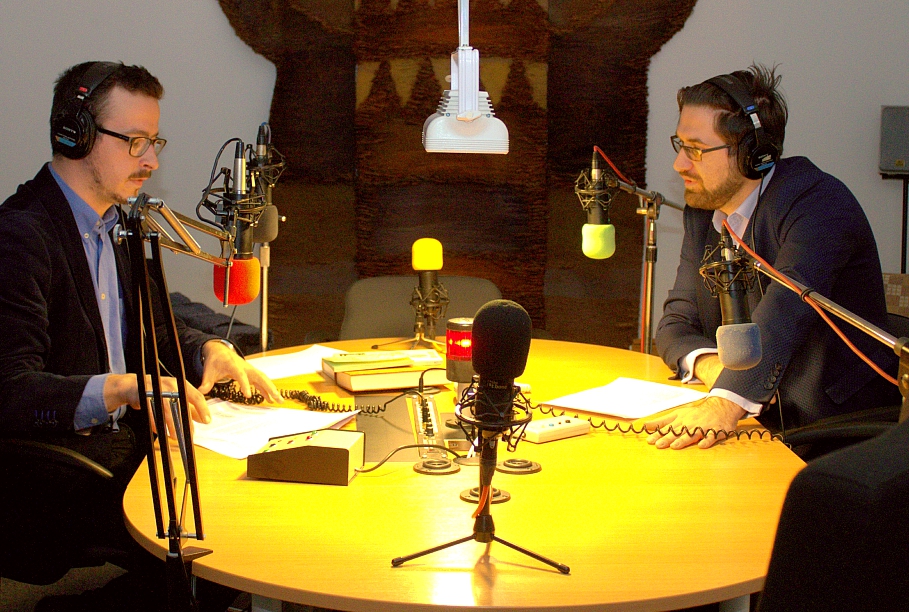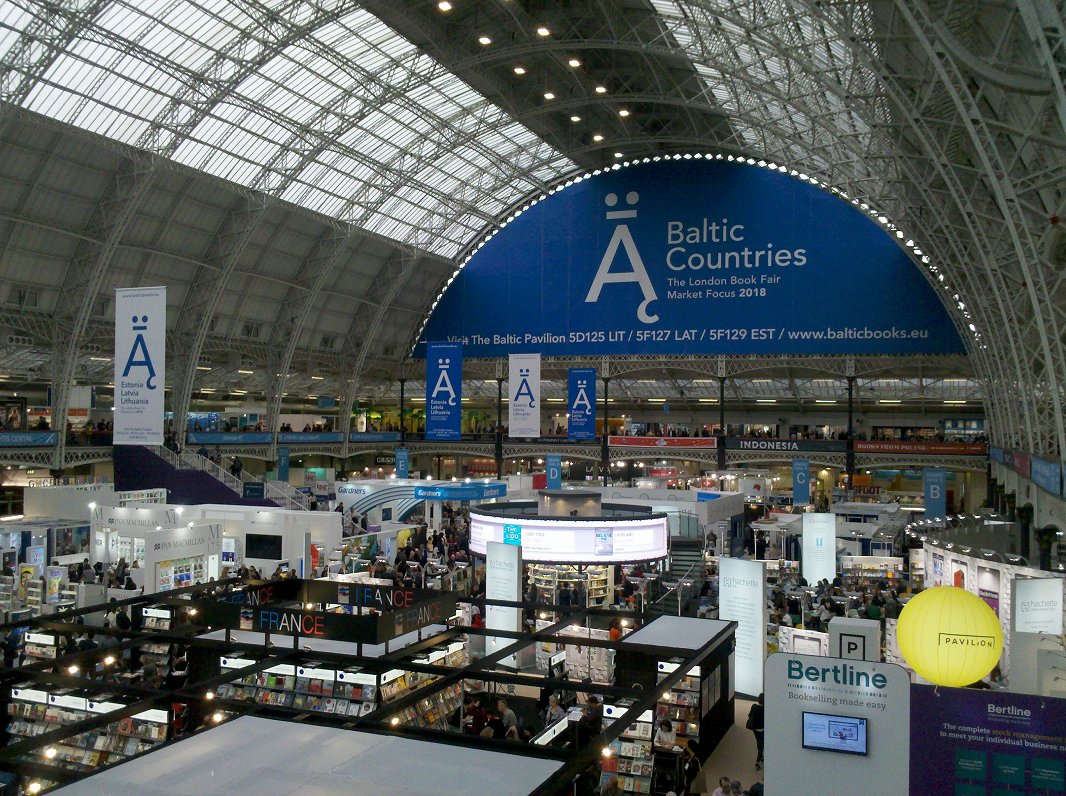Small posters advertising the Latvian stand, (which had been placed in both the ladies' and the gents') were disappearing fast. At first it was assumed that this was because the subject matter – a woman and a man sitting on a toilet with knickers/underpants round their ankles saying they were relieved to be “alone at last” – had proven too much for the hosts, or possibly the delegates of some countries' stands nearby with less enlightened attitudes towards bodily functions and sexual equality.
I was sent to scout out the gents – a task which might very easily have got me arrested – while a female colleague checked out the ladies' facilities, even though neither of us needed to go at that particular moment. It turned out that while the male posters were still in place, the female ones were indeed disappearing and for an unexpected reason: women were stealing them. People actually, finally, unequivocally realised Latvians have a sense of humour, and a fairly edgy one at that. For the #IAmIntrovert campaign that had sought to lampoon assumptions of grey, depressing Baltic seriousness, it was mission accomplished.
Now, one year on, Latvia returns to London's exhibition halls for the final pre-Brexit London Book Fair 2019 on March 12-14 with a smaller presence, but one that hopes to build on last year's centenary year triumph. Anete Konste, one of the stalwarts of the Latvian Literature stand and author of the IAmIntrovert comic books that grew out of the campaign says:
"We'll still be continuing the #IAmIntrovert campaign on the stand, but this year we'll have something called 'The Silent Space', a booth with complete sound isolation where people can escape all the noise of the LBF. And, yes, we'll have toilet adverts again."
But despite Latvia punching above its weight at book fairs such as the LBF, the small size of the domestic market, magnified by the fact that Latvian is a non-Slavic, Baltic language related only to Lithuanian, means even the most eminent writers have to hold down more than one job.
As an example, Pauls Bankovskis is not only one of the best-known and most widely-respected writers in Latvia, his output confirms he is one of the hardest-working. This is not a coincidence, he believes, saying:
“I deal with many different forms of writing - I write my own stories and novels, texts for ads, film scenarios, sometimes translations. I have regular columns in two press publications. Common to all of this is working with text, but the diversity is so great that if you happen to get stuck or a case of writer's block you can always look for rescue from one job in another.”
Writing in Latvian itself imposes a certain necessary discipline, Bankovskis says: “The English writer naturally writes in English, so his writing can be read right away in most parts of the world. Perhaps it contributes to some neglect of other languages, or even arrogance. The Latvian writer writes in Latvian and can be read only by a small handful of people in the world. If a Latvian writer wants others to read his or her writings, they have to look for translators, publishers - in other words, they have to work hard.”
Svens Kuzmins is another of Latvia's literary multi-disciplinarians, with a brief that includes popularising Latvian writing via a regular radio show, Cienījanmie lasītaji (Dear readers) which he co-hosts with poet Toms Treibergs. His new book, Hokhma will be published in Latvian by Dienas Gramata later this month.
“I feel that being 'exclusively' a writer is rather damaging to one's mental and physical health. For some it's copywriting. For others it's teaching and academia. Others are working odd jobs and create literature out of it. I am also guilty of this constant gravitation towards a literary core," says Kuzmins.

"My radio program is about literature. If there's one thing I've learned in my travels while making it, it's that readers come in all shapes and sizes, and you can find them in the most unexpected places. Just a few months ago I met a charming old geezer at the bar who worked in construction, a proper salt-of-the-earth type. He turned out to be a real aficionado of literature, very well read and up to date with all the local literary goings-on. He even showed me a notebook of his own writings,” says Kuzmins, who believes the near-obsession of Latvian literature with historical themes may finally be starting to give way to a more forward-thinking attitude.
“The market is quite saturated with historical literature. I remember thinking one day – well, where's all the futurism? There's hardly any to speak of. Or even down-to-earth psychological realism of the contemporary variety. There are a lot of niches to be filled, and I don't think they'll stay empty for long, since young writers are always on the hunt for something fresh,” Kuzmins says.
Perhaps the freshest stream among the Latvian literary landscape at the moment is children's literature, which draws on both the vibrant oral storytelling typical of northern Europe and another decidedly disciplined discipline: graphic design. The last two years have seen numerous stories translated into English, but none have had the runaway success of Luīze Pastore's Maskačkas Stasts (Maskatchka Story, named after a Rīga suburb and published in the UK by Firefly Press as Dog Town with a launch at last year's London Book Fair). In this case, Latvia's relatively small size may actually have been a boon, meaning that word of mouth recommendations have seen it flip through one genre to another with incredible speed.
“When I wrote the book in 2013, there was at first total silence about it. Nobody knew who Luīze Pastore was, so why bother? Within five years it has got a radio play version, a brilliant animated movie, lots of fans and an author who’s gone from no self-confidence to self-confidence boost XXL!” says Pastore.
“I must agree this would not be the case if I was a writer in a bigger market. It is really easy for an artist to be noticed in Latvia as the market is extremely small. If you ever dream of becoming world famous, writing in Latvian might not be the right path to take. The good news is that you are not obliged to write in a certain way to be published. We – writers and illustrators – are free to do whatever we want, there are no strict rules of what 'should' work in certain age groups.”
“When I got translated into English, I wanted to be involved in the process 100 per cent. The book was not localised – it was not adapted to British culture or surroundings, but we had to be aware that not all things would be completely understood. There were some additional texts added to explain local cultural aspects. It turned out that in British children’s books it is NOT OKAY for a hero to smoke tobacco, but it is okay to smoke cigarette - or was it the other way around? I still don’t understand! Also, if anyone wants to write another book about talking dogs, please, remember that there should be gender equality among the dogs. It turned out, I had completely forgotten about the existence of female dogs in my book,” laughs Pastore, providing further evidence of the self-deprecating Latvian sense of humour that was such a hit in the public conveniences of the London Book Fair.
You can revisit LSM's stories from the 2018 and 2017, including numerous audio interviews, in our archive.



























